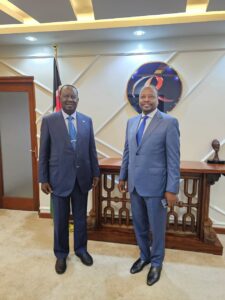Lynn Ngugi’s recent statement highlights a big concern in Kenya’s agricultural sector, the lack of value addition to key exports. This issue affects the country’s economy, as raw exports like coffee and tea fetch lower prices compared to processed goods.
Ngugi called out politicians who use phrases like “value addition” and “mechanisation” as nothing more than PR talk. She questioned what exactly these leaders have done, citing that in 2025, Kenya is still exporting raw produce with little to show in terms of actual progress. This sharp criticism comes at a time when the country is struggling with unemployment, low farmer incomes, and stagnant rural development.

Raila Odinga during a meeting with Agriculture CS Mutahi Kangwe. Photo/X
Ngugi’s post points fingers at Cabinet Secretary Mutahi Kagwe and others for turning important economic policies into empty slogans. Her frustration is centered around the fact that Kenya continues to export unroasted coffee beans to countries like Germany, Belgium, and the United States.
These countries roast, brand, and sell the coffee at much higher prices while Kenyan farmers and exporters earn far less. She asked directly, “What is so hard with roasting and branding our own coffee?” Her second example targets the tea industry, where Kenya still exports tea leaves in bulk.
The UK and other buyers then repackage and brand the tea, earning up to five times more profit. It’s the same story with macadamia nuts. Kenya sends them raw or semi-processed to the US, China, and Europe, where they are roasted, packed, and sold at crazy prices. When it comes to avocados and flowers, Ngugi says no explanation is even neededbit’s obvious Kenya is giving away the wealth while others cash in.
These points are backed by research showing that exporting raw products leads to lower profits for Kenya, while other nations benefit by processing and branding them. Despite various government promises, there is little to show.
The government has talked about targeting the US$ 171.8 billion global superfoods market, with crops like avocados, macadamia, and blueberries. Vision 2030 also includes plans for local manufacturing. But Kenyans are yet to see these ideas turn into results.
Ngugi suggested that the next time politicians meet, they should be clear and specific about which crops will no longer be exported in raw format, and stop feeding the public with empty words and staged photo sessions.
The frustration is echoed widely across social media. Users are questioning why, after more than 60 years of independence, the country is still exporting raw materials while other nations make the real profits.
Farmers who grow these crops get very little in return, and there are fewer jobs because the processing happens elsewhere. The slow pace of reform not only affects earnings but also means that Kenya misses out on building industries, creating employment, and expanding agricultural technology.
Yet most of Kenya’s exports still leave the country in their raw state. While a few companies like Sasini and Vegpro Kenya are trying to process products locally, the scale is too small to change the overall picture. Recent decisions like suspending avocado and macadamia exports in 2024 due to quality concerns are signs that there’s recognition of the problem but the solutions remain slow and inconsistent.
It’s time for leaders to stop using “value addition” as a PR gimmick and start delivering real economic change.



